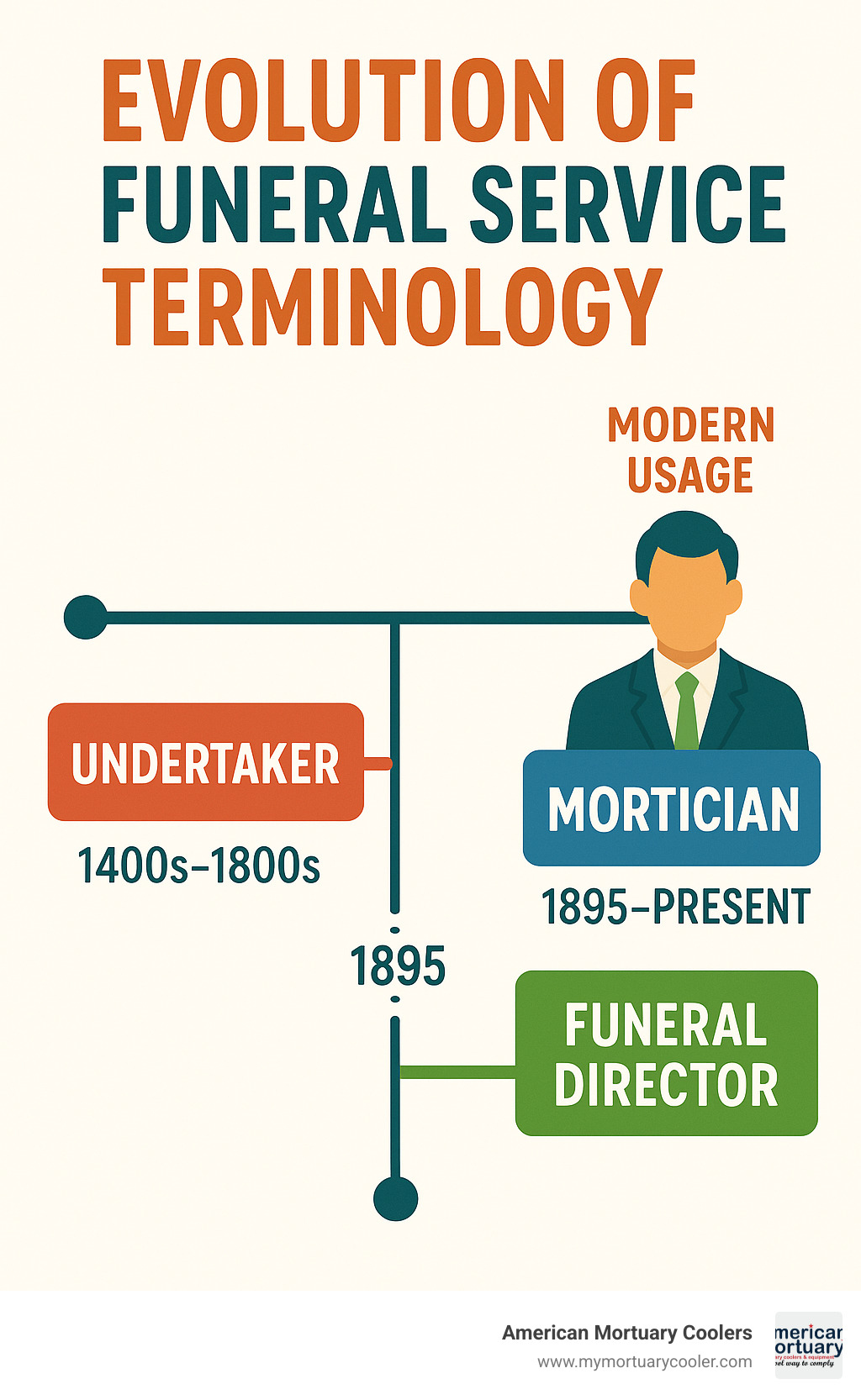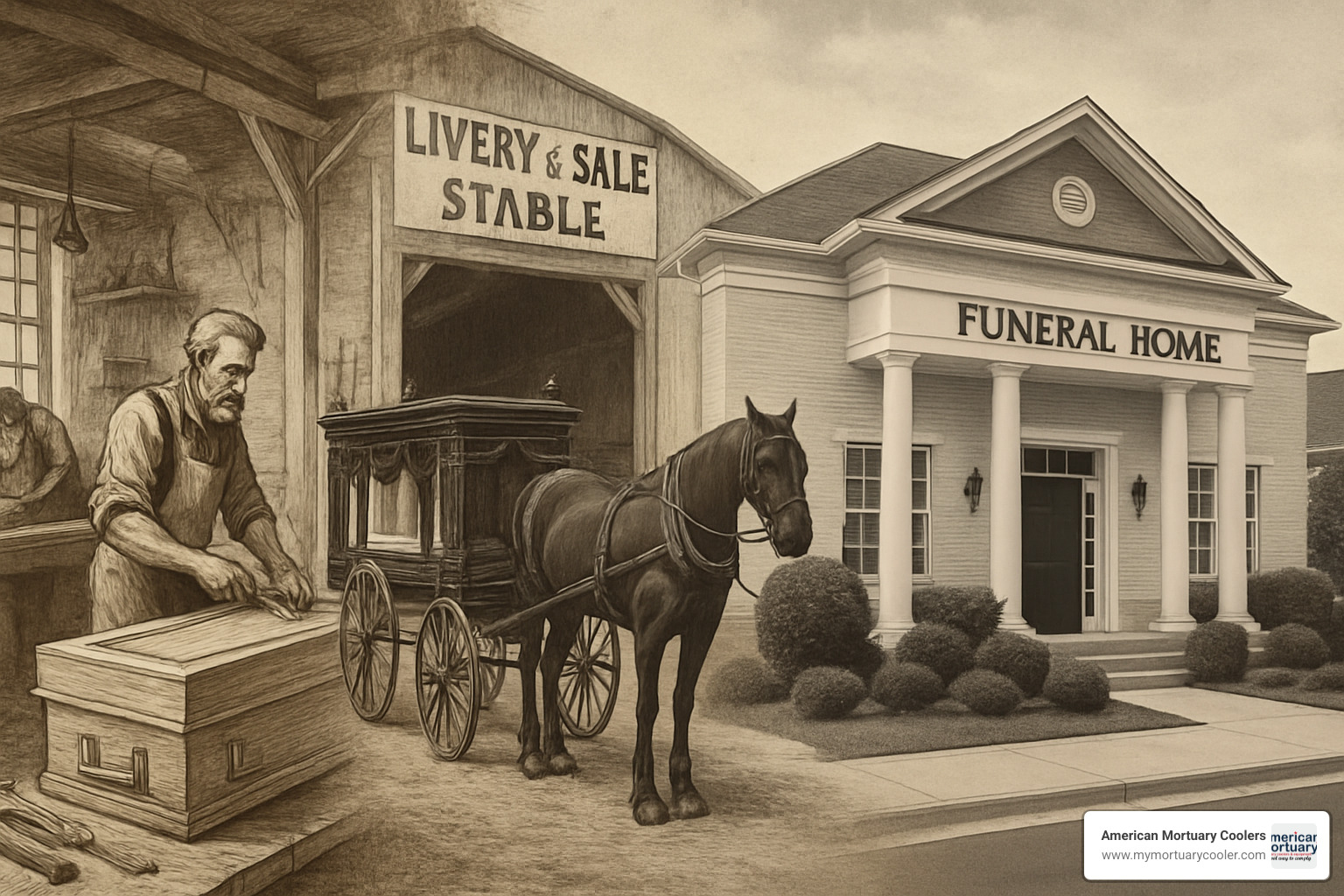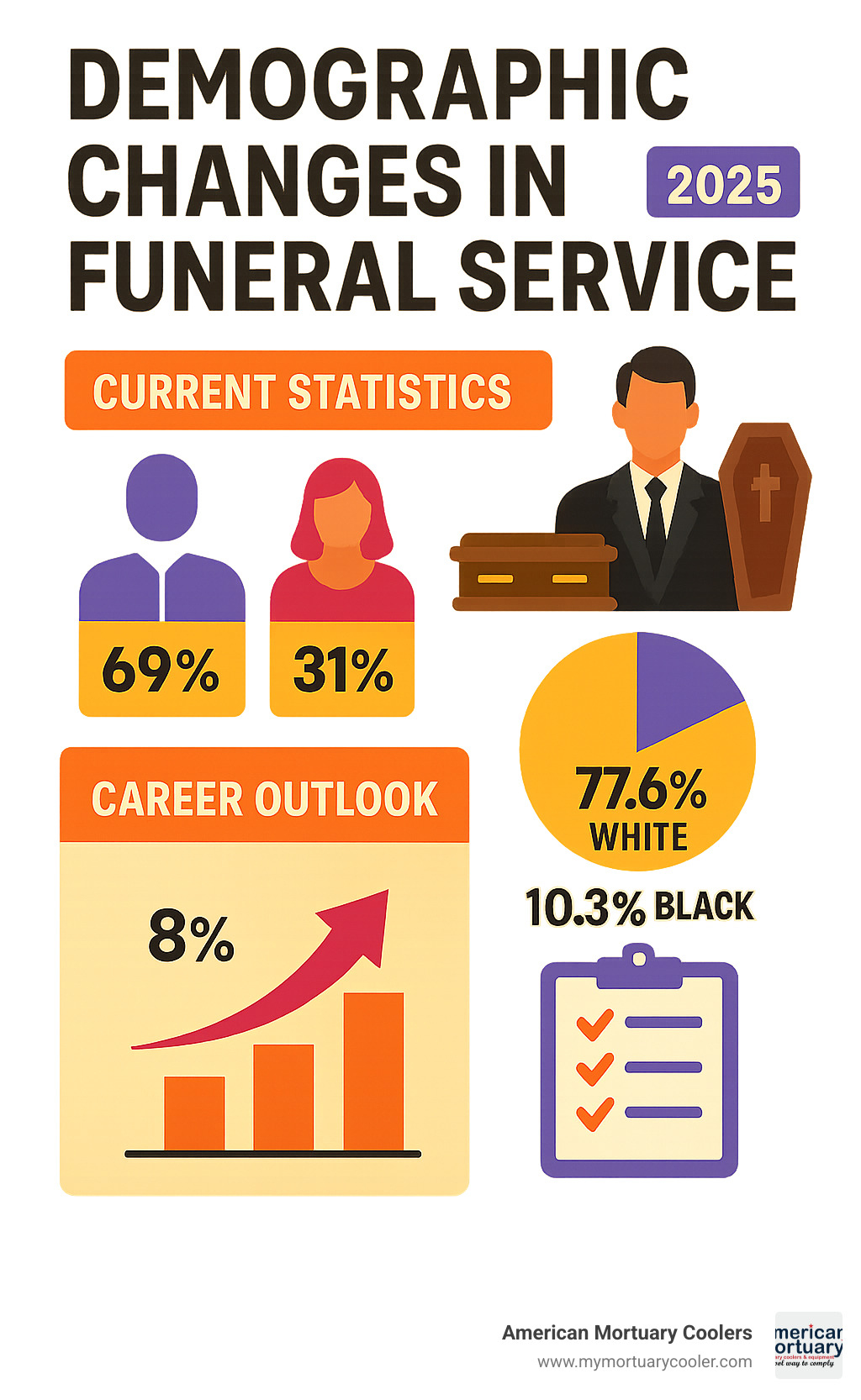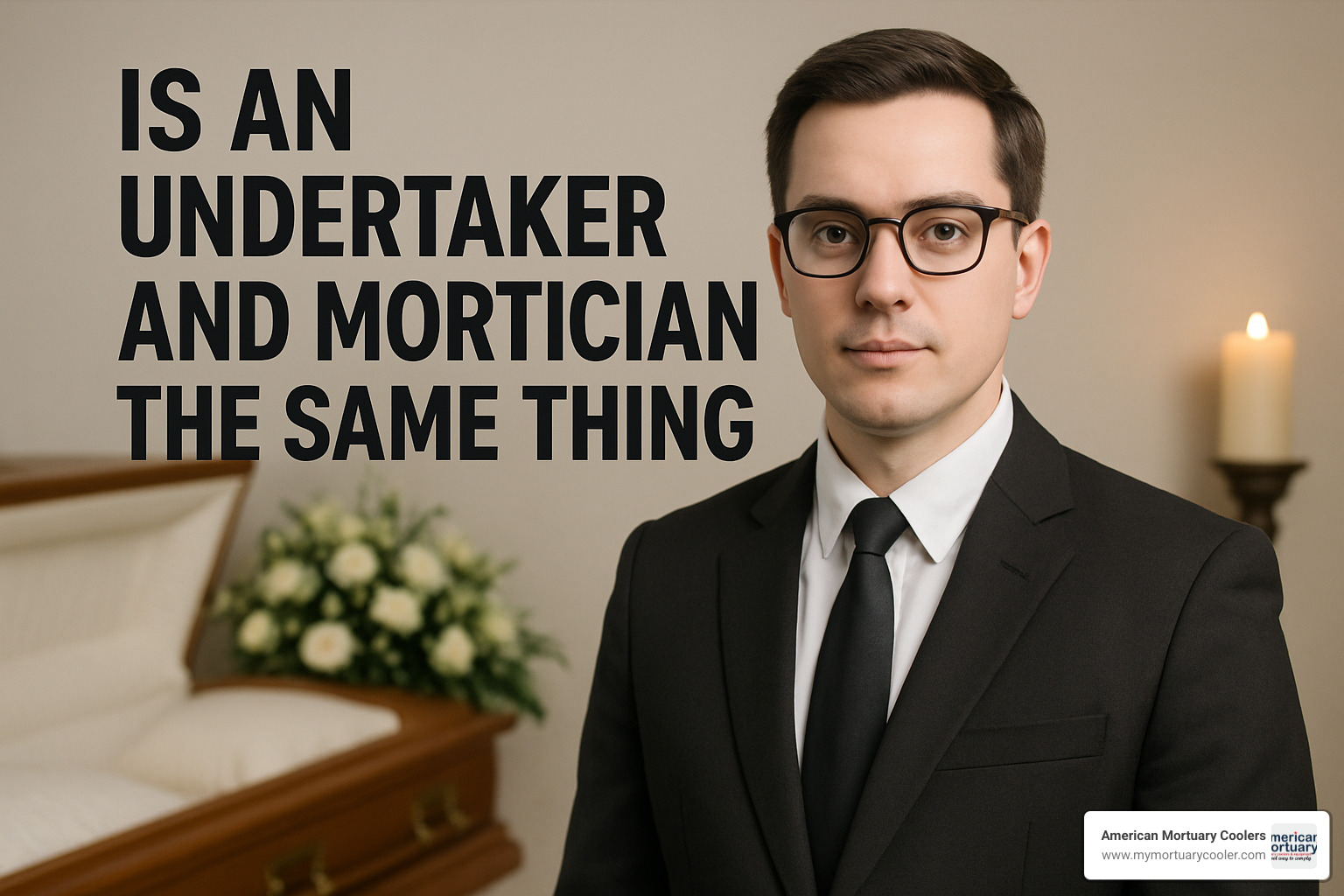Understanding the Confusion Around Funeral Service Terminology
Is an undertaker and mortician the same thing? Yes, they are essentially the same profession. Both terms refer to licensed professionals who prepare bodies for burial or cremation and arrange funeral services. The confusion comes from historical changes in terminology - "mortician" was adopted in 1895 to replace "undertaker," which had developed negative connotations.
Quick Answer:
- Undertaker = Original term (1400s-1800s) for funeral professionals
- Mortician = Modern American term (1895-present) for the same role
- Funeral Director = Current preferred title emphasizing management duties
- All three terms = Used interchangeably today
The funeral service industry has used different job titles for over 500 years. What started as "undertakers" in the 1400s became "morticians" through a trade magazine contest in 1895. Today, most professionals prefer "funeral director" as it sounds more professional and covers the full scope of their work.
This terminology shift reflects how the profession evolved from simple body transport to comprehensive grief support services. According to industry data, 69.1% of funeral directors are male, but women now make up 57% of mortuary school students, showing how the field continues to change.
As American Mortuary Coolers, a national-level mortuary cooler supplier with experience in the death-care industry, we've worked with countless funeral professionals who face questions about is an undertaker and mortician the same thing from families during difficult times. Understanding these terms helps funeral homes communicate more clearly with grieving families and reduces confusion about professional roles.

Is an Undertaker and Mortician the Same Thing?
The short answer is yes - undertaker and mortician are synonymous terms for the same profession. Both describe licensed professionals who handle the preparation of deceased individuals and coordinate funeral services. The confusion comes from how these job titles evolved over time, not from actual differences in what these professionals do.
Back in 1895, funeral professionals decided they needed a fresh start. The term "undertaker" had picked up some negative baggage over the years. So embalmers held a contest through Embalmers' Monthly magazine to find a better name. The winning entry? "Mortician" - a clever combination of the Latin word "mort" (meaning death) and the French suffix "icien" to make it sound as prestigious as "physician."
Today's funeral professionals handle the same core responsibilities whether they call themselves undertakers, morticians, or funeral directors. They embalm and prepare bodies, coordinate funeral services, provide grief support to families, handle legal paperwork and death certificates, arrange transportation, and manage burial or cremation logistics.
The terminology has continued evolving. While "mortician" replaced "undertaker" in the 1890s, many professionals today prefer "funeral director" because it emphasizes their role in managing the entire funeral process, not just body preparation.
| Term | Origin | Primary Usage | Current Status |
|---|---|---|---|
| Undertaker | 1400s-1600s | Historical, British | Still valid but less common |
| Mortician | 1895-present | American preference | Widely accepted |
| Funeral Director | 1900s-present | Modern standard | Most professional |
| Embalmer | Ancient-present | Specific skill focus | Often separate license |
So, really, is an undertaker and mortician the same thing in daily practice?
In daily practice, things get more interesting. While the terms mean the same thing technically, modern funeral homes often have their staff wearing multiple hats. One person might handle everything from the initial family meeting to preparing the body for viewing.
Some subtle differences have emerged in how people think about these roles. When someone emphasizes being a mortician, they're often highlighting their expertise in body preparation - embalming, dressing, cosmetic restoration, and making sure the deceased looks peaceful and dignified. When they call themselves a funeral director, they're usually emphasizing the business side - working with families, coordinating logistics, and managing the entire funeral process.
The old term undertaker originally meant someone who "undertook" the specific task of getting the deceased to their final resting place. Today, it's used the same way as the other terms, though you'll hear it less often in American funeral homes.
Public perception matters too. Many families feel more comfortable working with a "funeral director" than an "undertaker." The newer title sounds more professional and caring. Regional traditions also play a role - some areas still prefer the traditional "undertaker" while others have fully accepted "mortician" or "funeral director."
Legally speaking, is an undertaker and mortician the same thing across the U.S.?
From a legal standpoint, most state licensing boards treat these terms as interchangeable. However, the specific requirements and what professionals are allowed to do can vary from state to state.
Single license states issue one comprehensive license covering all funeral service activities. It doesn't matter if you call yourself an undertaker, mortician, or funeral director - you're licensed to do the same work.
Dual license states require separate licenses for funeral directing and embalming. In these places, a professional might specialize in one area or get both licenses to offer complete services.
Most states require passing the National Board Examination, which covers both funeral directing and embalming knowledge. The test doesn't care what title you prefer - it measures whether you know how to do the job safely and professionally.
The typical licensing path includes earning an associate or bachelor's degree in Mortuary Science or Funeral Service, completing 1-3 years of supervised apprenticeship, passing state and national examinations, and meeting continuing education requirements.
For complete details about getting licensed and qualified in this field, our complete guide to mortician requirements and qualification steps walks you through everything you need to know.
Where the Words Came From: History & Etymology

The story behind funeral service words is more interesting than you might think. Understanding where these terms came from helps explain why people still wonder is an undertaker and mortician the same thing today.
When "Undertaker" Meant Something Completely Different
Back in the 1400s, an "undertaker" wasn't someone who handled funerals at all. The word simply described anyone who "undertook" a job - whether that was building a house, fixing a wagon, or running errands. It was basically the medieval version of saying "I'll take care of that for you."
By the 1690s, though, the word started sticking to funeral work specifically. This happened naturally because funeral arrangements required someone to coordinate many different tasks - and "undertakers" were the go-to people for getting things done.
The Practical Beginnings
Most early funeral undertakers came from two very practical backgrounds. Cabinet makers already knew how to build coffins, since woodworking was their specialty. Livery stable operators had the horses and carriages needed for funeral processions.
These weren't gloomy, mysterious figures - they were regular tradespeople solving practical problems for their communities. Many funeral homes today can trace their history back 100 or 150 years to a furniture shop or stable that gradually took on more funeral duties.
How the Civil War Changed Everything
The American Civil War brought a huge change to funeral practices through embalming. When President Lincoln was assassinated in 1865, his body was embalmed for a massive funeral train journey that covered 1,645 miles. Millions of Americans saw how well embalming preserved the body, and the practice spread rapidly.
This scientific advancement started changing how people viewed funeral work. It wasn't just about transportation and coffins anymore - it required real medical knowledge and skill.
The Great Name Change of 1895
By the 1890s, funeral professionals had a problem. The word "undertaker" had picked up some pretty negative associations. People connected it with shady business practices and creepy imagery. The professionals knew they needed a fresh start.
So they did something clever - they held a contest through Embalmers' Monthly magazine to find a better name. The winning entry was "mortician," carefully designed to sound as professional as "physician." It combined the Latin word "mort" (meaning death) with a French ending that suggested expertise and training.
This wasn't just about changing a word. It represented a complete shift toward viewing funeral service as a healthcare profession that required scientific knowledge and genuine compassion for families.
The Evolution Continues
The terminology kept evolving throughout the 1900s. Funeral director became popular as professionals wanted to emphasize their role in managing and coordinating services rather than just handling bodies. Different regions developed preferences - Americans generally adopted "mortician," while the British stuck with "undertaker" longer.
The name changes reflected real changes in the work itself. Modern funeral professionals do much more than their predecessors - they provide grief counseling, handle complex legal paperwork, coordinate with multiple vendors, and offer families many more options for honoring their loved ones.
This evolution explains why is an undertaker and mortician the same thing remains such a common question. The terms come from different eras, but they describe the same essential work of caring for the deceased and supporting grieving families.
For more fascinating details about this change, check out this account of how morticians reinvented their job title. The Oxford English Dictionary also provides deeper insight into the origins and meanings of "mortician".
What They Actually Do Today: Duties, Training & Licensing
Modern funeral professionals wear many hats, and their daily responsibilities have grown far beyond what undertakers did centuries ago. When people ask is an undertaker and mortician the same thing, the answer becomes clearer when you see how today's professionals blend traditional body care with modern grief support services.
The Reality of Modern Funeral Work
Walk into any funeral home today, and you'll find professionals juggling technical skills with heartfelt compassion. Embalming remains a core duty - using chemical preservation to slow decomposition while restoring a peaceful appearance for viewing. This delicate work requires steady hands and scientific knowledge of anatomy and chemistry.
But the job extends well beyond the preparation room. Funeral planning takes up much of their time, meeting with families to coordinate services, working with clergy and musicians, and managing countless logistics. Every funeral is different, and families often need guidance through dozens of decisions during their most difficult moments.
Grief counseling has become essential to the role. Today's funeral professionals receive training in psychology and communication, helping families process their loss while making practical arrangements. They're often the first professionals families encounter after a death, making their compassionate presence crucial.
The paperwork side might surprise people. Filing death certificates, handling insurance claims, coordinating with cemeteries, and ensuring regulatory compliance requires attention to detail and business skills. Modern funeral directors often spend as much time on administration as they do on traditional mortuary duties.
The Path to Professional Practice
Becoming a funeral professional today requires serious commitment to education and training. Most states require at least an associate degree in Mortuary Science, though many employers prefer bachelor's degrees. Students study anatomy, pathology, chemistry, and psychology alongside practical embalming techniques.
The apprenticeship phase typically lasts one to three years under supervision of licensed professionals. This hands-on training teaches everything from restoration techniques to family counseling skills.
Licensing requirements vary significantly by state. Some issue comprehensive licenses covering all funeral service activities, while others require separate credentials for funeral directing and embalming. The National Board Examination tests knowledge across both areas, regardless of which specific title professionals prefer using.
For detailed information about getting started in this field, our guide on mortician requirements and qualification steps walks through the complete process.
| State Type | Funeral Director License | Embalmer License | Combined License |
|---|---|---|---|
| Single License | ✓ | ✓ | ✓ |
| Dual License | ✓ | ✓ (separate) | - |
| Flexible | ✓ | Optional | ✓ |
A Changing Industry
The funeral service profession is experiencing fascinating demographic shifts. Currently, 69.1% of funeral directors are male, but women now make up 57% of mortuary school students. This change is bringing fresh perspectives to a traditionally male-dominated field.
Career prospects look strong, with 8% projected growth through 2031 - faster than most occupations. The median salary for funeral directors reaches $74,000, while mortician and funeral service arrangers earn around $48,950. About 7,900 job openings emerge annually across the country.
Success in this field requires unique skills. Complex problem-solving helps when managing multiple family needs simultaneously. Service orientation keeps families' needs at the center of every decision. Social perceptiveness allows professionals to read emotional cues and respond appropriately during grief.
The most successful funeral professionals combine technical expertise with genuine empathy. They understand that families remember not just the quality of their loved one's preparation, but how supported they felt during the entire process.
At American Mortuary Coolers, we've worked with funeral professionals across all 48 contiguous states. Whether they call themselves undertakers, morticians, or funeral directors, they all share one thing in common - the need for reliable equipment that helps them serve families with dignity and respect.
For more insight into the daily responsibilities of these dedicated professionals, check out our comprehensive guide to what a mortician does.

Regional Preferences & Common Misconceptions

When families ask is an undertaker and mortician the same thing, the answer can vary depending on where you live. Geography and culture play a surprising role in which terms people prefer and how they understand these professions.
American Funeral Homes Lead the Change
Here in America, we've fully adopted "mortician" since that famous 1895 contest. Most American funeral homes now prefer "funeral director" because it sounds more professional and captures what they actually do - direct the entire funeral process, not just prepare bodies.
Walk into any American funeral home today, and you'll likely see business cards reading "Funeral Director" or "Licensed Funeral Director and Embalmer." The word "mortician" still appears frequently, especially in smaller towns where tradition runs deep. "Undertaker" has become the least common term, though older generations still use it without any confusion.
The British Keep Their Traditions
Across the pond, things work differently. British funeral homes held onto "undertaker" much longer than we did. Even today, you'll hear it more often in the UK than in American funeral parlors.
The interesting twist? Even Britain is slowly shifting toward "funeral director." Their professional association made this change way back in 1905, but everyday language takes longer to catch up. It's like how we still say "dialing" a phone number even though phones haven't had dials for decades.
Canada Splits the Difference
Our neighbors to the north typically use "funeral director" as their go-to term. This makes sense - Canada has always balanced British heritage with American influence. Their licensing works similarly to ours, combining scientific training with compassionate care.
The Myths That Won't Die
Working in the funeral industry, we hear the same misconceptions over and over. Let's clear up the biggest ones that confuse families during already difficult times.
Some people think "undertakers only bury people six feet under" - but that's not where the name comes from at all. "Undertaking" meant taking on any big task, from building houses to organizing funerals. The six-foot burial depth came from old public health rules, not job titles.
Another common myth suggests "morticians are more qualified than undertakers." This simply isn't true. Is an undertaker and mortician the same thing in terms of training? Absolutely. Your qualifications depend on your state license and education, not what title you prefer.
Many families also believe "funeral directors don't handle bodies" because the title sounds more administrative. In reality, most funeral directors also perform embalming and body preparation, especially in smaller funeral homes where everyone wears multiple hats.
Hollywood's Influence on Perception
Movies and TV shows haven't done funeral professionals any favors. "Undertaker" often appears in scary movies or gothic stories, making it sound creepy or old-fashioned. Meanwhile, "funeral director" sounds like someone who might help plan your grandmother's memorial service with dignity and care.
These media portrayals create unrealistic expectations. Real funeral professionals spend most of their time counseling grieving families, handling paperwork, and coordinating services - not lurking around graveyards in the moonlight.
Professional Branding Continues to Evolve
The shift toward "funeral director" reflects how many professions have updated their titles. Just like "sanitation engineers" sounds more professional than "garbage collectors," funeral homes choose titles that better represent their comprehensive services.
Today's funeral professionals adapt to changing family preferences. They offer green burial options, cremation services, and celebration of life ceremonies rather than just traditional funerals. Some even provide technology for remote participation when family members can't attend in person.
At American Mortuary Coolers, we've worked with funeral homes across all 48 contiguous states. Whether they call themselves undertakers, morticians, or funeral directors, they all need the same thing - reliable equipment to serve families with dignity. The title on their business card matters less than their commitment to compassionate care during life's most difficult moments.
Frequently Asked Questions about Undertakers & Morticians
Why do people use different titles for the same profession?
The mix of titles we hear today tells the story of how funeral service has grown and changed over hundreds of years. Think about it - what started as simple carpentry and horse-drawn transportation has become a profession that requires scientific training, business skills, and the ability to comfort grieving families.
The push for professionalism really kicked off in 1895 when funeral professionals got tired of the negative baggage that came with "undertaker." They wanted their work to be seen as respectable and important, similar to doctors or lawyers. So they literally held a contest to find a better name - and "mortician" won because it sounded medical and professional.
Regional traditions also play a huge role in which term you'll hear most often. If you grew up in an area where families have used the same funeral home for generations, you might still hear "undertaker" regularly. Other communities fully acceptd "mortician" or moved on to "funeral director."
Marketing matters too. Many funeral home owners choose their professional titles based on what makes families feel most comfortable during difficult times. "Funeral director" often feels more approachable and less intimidating than "undertaker" - especially for families who are already dealing with grief and stress.
The reality is that is an undertaker and mortician the same thing - absolutely yes. The different names reflect how the profession has evolved, not different types of work.
Does every undertaker perform embalming?
This is where things get interesting because the answer depends on where you live and how your state handles licensing. Not every funeral professional performs embalming, and not every funeral service requires it either.
Some states keep things separate. They require different licenses for funeral directing and embalming. In these places, you might work with a funeral director who handles all the planning and coordination while a licensed embalmer takes care of body preparation. Many professionals get both licenses so they can offer complete services.
Other states bundle everything together into one comprehensive license. This means the person helping your family can handle every aspect of the funeral service, from the first phone call to the final arrangements.
Many families don't need embalming anyway. If you're choosing direct cremation, immediate burial, or green burial options, embalming might not be necessary or even wanted. Some religious traditions actually discourage or prohibit embalming entirely.
Even when embalming isn't required for every service, most funeral professionals learn these techniques during their training. This knowledge helps them serve families who do want viewing and visitation services.
For more details about how embalming fits into funeral service, check out our guide on whether a mortician and embalmer are the same.
Which term is most accepted in the industry today?
"Funeral director" has become the clear winner in today's funeral service industry, though you'll still hear all three terms used regularly. There are some pretty practical reasons why this title has taken the lead.
It sounds more comprehensive and professional. When families hear "funeral director," they understand that this person will coordinate everything - not just handle body preparation. The title suggests someone who can manage complex logistics, provide emotional support, and guide families through difficult decisions.
Families feel more comfortable with the term. Let's be honest - "undertaker" can sound a bit old-fashioned or even spooky to some people. "Funeral director" feels more modern and approachable, which matters when families are already dealing with loss and stress.
The education system supports it. Most mortuary science programs prepare students to become "funeral directors," and professional associations like the National Funeral Directors Association use this as their standard terminology.
But regional preferences still matter. In some communities, "mortician" remains the go-to term, and "undertaker" is still perfectly acceptable - especially in traditional or rural areas. What matters most is that families understand they're working with qualified, licensed professionals.
The bottom line? Whether someone calls themselves an undertaker, mortician, or funeral director, they're all providing the same essential services to help families during one of life's most difficult times. Is an undertaker and mortician the same thing? Yes - and they're all here to help when you need them most.
Conclusion
So, is an undertaker and mortician the same thing? Yes—different words for the same licensed professional dedicated to dignified body care and compassionate family support.
The shift from cabinet-making undertakers to modern funeral directors shows how the field blended science, business and empathy. No matter the title, today’s practitioners juggle embalming, paperwork and grief guidance—often around the clock.
American Mortuary Coolers is proud to stand beside them from our hubs in Johnson City TN, Atlanta GA, Chicago IL, Columbia SC, Dallas TX, Los Angeles CA, New York NY and Pittsburgh PA. Our durable, custom mortuary coolers free staff to focus on families rather than equipment problems.
Terminology may evolve, but the mission stays the same: honoring the deceased and easing grief. For a deeper look at how funeral professionals serve their communities, visit our guide on understanding the mortuary role in death care and funeral services.
When families ask is an undertaker and mortician the same thing, they really want reassurance that they’re in capable hands. Whatever the business card says, American Mortuary Coolers is honored to support these professionals with the reliable equipment they need to serve with dignity.


















